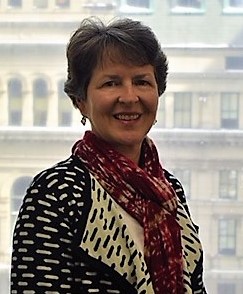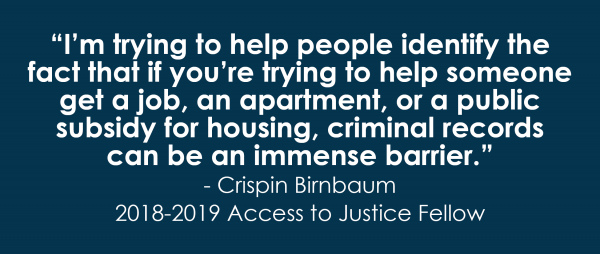Access to Justice Fellow is Helping People Get a Fresh Start
 By the time Access to Justice Fellow Crispin Birnbaum retired from her position as General Counsel for the Massachusetts Probation Service (MPS) in May 2018, she had amassed nearly 34 years of experience in various state government offices.
By the time Access to Justice Fellow Crispin Birnbaum retired from her position as General Counsel for the Massachusetts Probation Service (MPS) in May 2018, she had amassed nearly 34 years of experience in various state government offices.
“The combination of all my experiences made me wonder what I might carry with me and what I might be able to offer,” she says. “Part of me wanted to retire and just travel, and part of me wanted to give back.”
She had a lot to offer, of course, thanks to her many decades of work as an attorney for the Commonwealth. Crispin started her career in 1984 as an Assistant District Attorney in Middlesex County. By the time she accepted a role as an Assistant Attorney General over ten years later, she was prosecuting murder cases and co-leading a Superior Court team of fellow ADAs. She stayed on at the AG’s Office for just over another decade, during which time she switched her focus from criminal to civil litigation.
In 2006, Crispin accepted the position of General Counsel for the Department of Youth Services (DYS). Her new role was markedly different from her 22 years as a litigator; for the first time she was working to better the lives of the people she had once prosecuted.
“I came to really have a much broader, much more enlightened perspective about how to help people who are given criminal records,” she says. “Do those records follow them for the rest of their lives? How can we help them once they’ve paid their debt?”
These were the same questions Crispin continued to ask when she became the MPS General Counsel in 2013. Like DYS, MPS is an offender-serving agency, but with a broader focus and twice the staff. As General Counsel, Crispin oversaw the Legal Unit, working with her team to draft policies and legislative strategies and leading trainings for MPS staff.
In April 2018, a month before Crispin retired, Governor Charlie Baker signed the Criminal Justice Reform Act, a landmark bill with major implications for the state’s criminal justice system. Among its many sweeping provisions, the bill included new provisions for the sealing and expungement of criminal records.
These provisions marked what Crispin says is real progress for individuals with criminal records. She knew she couldn’t stay to assist from the inside, but she was unsure how nonprofits that serve these clients would learn about the complexities of the bill.
Inspired to draw on her wealth of accumulated knowledge, Crispin returned from her post-retirement travels and began studying the new law and creating training materials. That fall, she kicked off a series of legal and non-legal volunteering gigs, including working at Veterans Legal Services (VLS) and Food for Free.
Eventually, through her volunteer work, Crispin discovered the Clearinghouse’s Access to Justice Fellows Program. Created to engage senior and retired attorneys and judges in pro bono projects, the program was the perfect fit for Crispin as she looked to expand her contributions.
As a 2018-2019 Fellow, in addition to continuing her work with VLS, Crispin is now working closely with Clearinghouse staff to mentor the Clearinghouse’s legal clinic volunteers and lead trainings for nonprofits and other client-facing organizations, such as veteran groups and law school clinical programs.
 “I’m trying to help people identify the fact that if you’re trying to help someone get a job, an apartment, or a public subsidy for housing, criminal records can be an immense barrier,” she says. “Educating people about how criminal records work in Massachusetts, along with the changes in the law of sealing and expungement, is the goal. If more and more staff members, law students, and attorneys become interested in helping individuals reduce those barriers, all the better.”
“I’m trying to help people identify the fact that if you’re trying to help someone get a job, an apartment, or a public subsidy for housing, criminal records can be an immense barrier,” she says. “Educating people about how criminal records work in Massachusetts, along with the changes in the law of sealing and expungement, is the goal. If more and more staff members, law students, and attorneys become interested in helping individuals reduce those barriers, all the better.”
And though she’s certainly an expert on the matter, Crispin doesn’t want anyone to think she’s inventing the wheel.
“There are people who have been doing this work for a long time trying to help offenders and help with re-entry. I admire them and I’ve been aware of their work for a long time,” she says. “I like to think that I’ve simply joined the ranks of those who are trying to help people get out from under their criminal records.”
Crispin’s formal Fellowship will end in June, but she’s already thinking about becoming a continuing Fellow to keep on doing this work.
“[Being a Fellow] has been tremendous,” she says. “And I’m open to continuing to do this work as long as I’m needed and as long as I can help. I’m excited to see where it leads.”